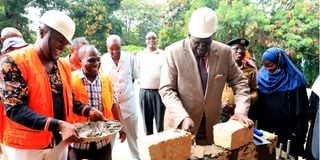It’s time for transformative education for our children

Education Cabinet Secretary Prof. George Magoha puts a Construction Block on one of the walls of a Competency-Based Curriculum (CBC) Class at Bomu Secondary School in Mombasa on July 21, 2022.
What you need to know:
- The skills inherent in CBC are critical to preparing 21st Century learners for the future; the hard part is making the implementation practical.
- But the curriculum and TVET are only as good as the teachers who deliver it. Recognition of the teacher in the manifesto is a mark of vision and purpose.
- Evidence shows there is no better education investment than in teacher quality.
President William Ruto’s decision to establish an Education Reform Taskforce on the Competency-Based Curriculum (CBC) demonstrates his strong political will for education transformation.
This is because education is a major policy issue for the new government. It is one of the most important things to get right for any government.
It builds future citizens, and the workforce, and is the greatest equaliser that allows equity.
Curriculum matters in an education policy. It provides the blueprint for the type of learners a country wants schools to nurture.
It is thus right that the new government addresses concerns on CBC implementation.
Having supported Rwanda to develop a similar curriculum seven years ago, I know we should not throw out the baby with the bathwater.
The skills inherent in CBC are critical to preparing 21st Century learners for the future; the hard part is making the implementation practical.
The Kenya Kwanza manifesto pledges investment in Technical Vocational Education and Training (TVET), which is welcome.
Connecting education to the world of work is necessary and will support Kenya to realise its youth dividend.
My organisation could offer support to the related focus on Science, Technology, Engineering and Mathematics (Stem).
But the curriculum and TVET are only as good as the teachers who deliver it. Recognition of the teacher in the manifesto is a mark of vision and purpose.
Evidence shows there is no better education investment than in teacher quality. As reform expert Michael Barber says, ‘the quality of an education system cannot exceed the quality of its teacher”.
Teacher supply, particularly in the arid and semi-arid lands (Asal), is a critical challenge to the country’s education system.
The policy on teacher deployment and incentivisation is a good initiative.
The manifesto's commitment to teacher training is key. Research shows professionals learn best from colleagues.
Provide opportunities for peer teaching, mentorship and coaching and recognition for those teachers leading their peers: It will create a ripple effect to spread instructional excellence countrywide.
The government recognizes some children have been left behind in access to quality education.
Two critical hurdles exist. The first is access. In 2019, more than a million children of primary school-going age were not in class. The second is quality.
About six out of 10 children face what the World Bank defines as 'learning poverty’—not being able to read a simple text by the age of 10. The outbreak of Covid-19 exacerbated the problem.
The problem of access and quality are more acute in Asals and urban slums.
But smart interventions can reverse this situation. For example, St Thomas Secondary School, which attracts girls from the most difficult backgrounds in Kilifi County, won the national science contest.
Technology is key in addressing some of the barriers to access and quality. Covid-19 demonstrated the potential, making virtual learning possible during the prolonged shutdown of schools.
However, that requires proper ICT infrastructure. Therefore, focusing on the Special Service Tariff to build a stronger schools’ tech ecosystem (rather than hardware) is a smart investment. Transformation is possible.
The first step for the new administration should be to create a clear roadmap from their political pledge and, as befits a President for everyone, build rapid consensus behind it--including among parents, unions and wider partners.
The next step is some form of a results unit--to steer delivery. That is the immediate challenge. If the new administration can rise to the occasion, real change that makes a difference for Kenyan children is possible.
We stand ready to offer our support.
Mr King is the regional director, Education Development Trust. [email protected].





